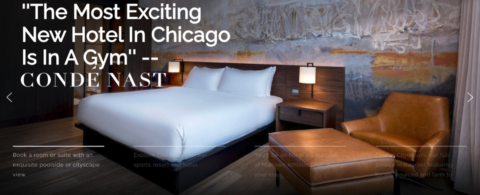Throughout the course of the pandemic, hospitality marketing strategies have had to shift dramatically.
Consumer behavior, lockdowns, and travel restrictions have wreaked havoc with hospitality marketing messaging.
Now that the industry is bouncing back, with more and more people itching to travel, it’s time to get creative with your hospitality brand’s content.
Check out some fun and engaging content marketing trends we saw last year and anticipate we’ll see this year as hospitality opens back up:
1. Touchless And Digital Hotel Technology
With COVID still looming around and many safety protocols in place, the importance of digitally-assisted interactions has grown (in other words, no touching the same screens as hundreds of other people).
According to PWC, 81% of travelers were already looking for more digital service options from their hotel brands in 2019 – and the demand has only grown since then.
Naturally, touchless technology was the route to go during a worldwide pandemic, so this is the type of technology that really saw a boom in the industry.
If you’re traveling in the next few months, you may see more and more hotels using technology such as touchless faucets, automated doors, and more.
In the future, you may even be able to control different aspects of your guest room, such as the lights, thermostat, and TV, from an app on your phone.
Not only does technology like this help ensure that everyone – employees and guests alike – are safe and comfortable, it also makes their stay more enjoyable as well!
The pandemic is (hopefully) winding down now, but germs will always exist and guests will always be looking for a way to make traveling easier and more simplified.
It’s never a bad idea to institute some of these touchless additions to your facility.
2. Promoting Safety
Speaking of safety, one of the most popular trends in hospitality marketing in the wake of COVID is the importance of highlighting and advertising a brand’s pandemic protocol and safety procedures.
Examples can be increased cleaning and sanitation, social distancing, enforcing the mask policy, and contactless food and concierge options.
Advertising this on a brand’s website and also upon arrival shows clear communication and commitment to guest safety, which improves customer satisfaction.
You can use attributes and the description field on Google Business Profiles to showcase these efforts in local search results, as well.
3. Encouraging Staycations
With many individuals still hesitant to travel abroad or even domestically, people have turned to traveling locally, or going on a “staycation.”
Supporting your local community has also become more important in recent years, making staycations even more appealing.
With that being said, brands should be marketing their saunas, gyms, spa/massage services, and food delivery.
The Hotel at Midtown in Chicago does a great job of this by enticing locals to check out their restaurants, world-class fitness center, indoor and outdoor pools, and more.
Not to mention you have the entire city of Chicago at your disposal, so why not skip the plane ticket and vacation in your own city?
4. Highlight Flexible Cancellations
The world is a very uncertain place right now, and many hotels and flights could cancel last minute.
Brands should offer a generous cancellation policy, which allows customers to either rebook or be refunded.
It’s not the guest’s fault that their trip may have been canceled, and you don’t want to place additional stress on the guest for not being able to get a hotel credit or be refunded.
Some airlines, for example, have generous cancellation policies while others do not.
Chances are those with generous cancellation policies have a higher customer satisfaction score vs. those that aren’t so lenient.
While it’s true that many businesses compete on pricing, they also compete on customer experience and reputation.
For many audiences, it won’t matter how affordable your brand is if it comes with poor customer service.
Although Southwest Airlines isn’t considered a “luxury” airline (as they don’t offer first or business class seats), they have one of the highest customer satisfaction ratings in the airline industry.
This could be partly due to the fact that they also have one of the most flexible cancellation policies.
Customers will return to a brand when they are happy with the quality, experience, and customer service.
5. Work From Home… Or A Hotel
Why work from home day after day when you can work from a luxury hotel or resort?
More and more hotels are enticing business professionals to trade in their slippers and Zoom attire for casual wear that they can lounge in while working from a hotel lobby or coffee shop.
Hotels can market to those remote workers by offering free wi-fi or a cup of coffee when visiting their facility.
Some even have designated workspaces that are clean and quiet and perfect for those who can’t go into an office but for whose house may not be the ideal work environment.
It’s always nice to have a change of scenery, and who doesn’t want to get out of their house from time to time anyway?
Market your hospitality business as a great place to work, or even just to meet friends and catch up!
6. Influencer Marketing
The power of social media is incredible; it affects essentially every market worldwide, and so you need to learn to use it to the advantage of your business.
Whether you love them or hate them, influencers have taken over social platforms.
Influencer marketing has become a necessity for hospitability businesses when it comes to keeping up with competitors.
By using influencer marketing, brands can reach a much larger audience (the bigger the influencer, the bigger the audience) and attract more targeted consumers.
If you partner with an influencer in your space, this can be seen as one of the most valuable marketing tools because that influencer has trust with his/her audience and that trust will translate to your brand.
The #LetHawaiiHappen Campaign was a huge success when the Hawaii Tourism Authority partnered with a variety of popular Instagram influencers, encouraging them to post photos of themselves in some of Hawaii’s most popular (and beautiful) tourist attractions while using the aforementioned hashtag.
7. User-Generated Content
User-generated content is content that is created by users themselves as opposed to employees of the business.
This includes reviews and testimonials, as well as any time someone comments about a company (an online forum, like Quora, for example).
Potential customers typically value user-generated content because the users have no reason to be dishonest; they’re not being paid or reimbursed for their review of a brand, so it’s safe to say whatever they write will be truthful.
These are the types of reviews that are important for brands to highlight on their website.
So, how can you make it happen?
As a business, always encourage past customers to write reviews and share their experiences on social media.
Create a hashtag (or a few) and have customers use them when posting about your business on social media (see the example #LetHawaiiHappen, for example).
You could even reach out to the influencers we mentioned in the paragraph above and encourage them to check out your business and leave an honest review!
If you’re a solid business, this will only help you in the end.
If you find yourself with a lot of negative reviews, perhaps it’s time to take those into account and start making the changes you need to succeed.
8. Buy Now, Pay Later
Similar to the point above about making cancellations easy and avoiding change fees, many are still feeling uneasy about their financial situation.
Lately, we’ve seen different companies offer a “buy now, pay later” option to help hook customers and get them committed to making a purchase.
This allows the business to not miss out on any urgent appeals or promotions they may be running, and it allows the consumer to feel confident that they got the best deal without having to put any money down.
A great example of this is Uplift, which has partnered with a variety of international travel organizations from cruise lines to airlines to vacation packages in an attempt to ignite the travel industry by allowing patrons to “make thoughtful purchases now and pay over time…”
Final Thoughts
Hospitality marketing is hot right now and will only pick up more sizzle throughout the next few years as the world begins to open back up.
Using the tips above will help maximize revenue and increase customer retention and satisfaction. Safe travels and happy marketing!
More resources:
- Hospitality SEO Best Practices For 2022 & Beyond
- Local SEO for Hotels: Keys to Drive Rankings, Traffic & Bookings
- Content Marketing: The Ultimate Beginner’s Guide to What Works
Featured Image: vichie81/Shutterstock



